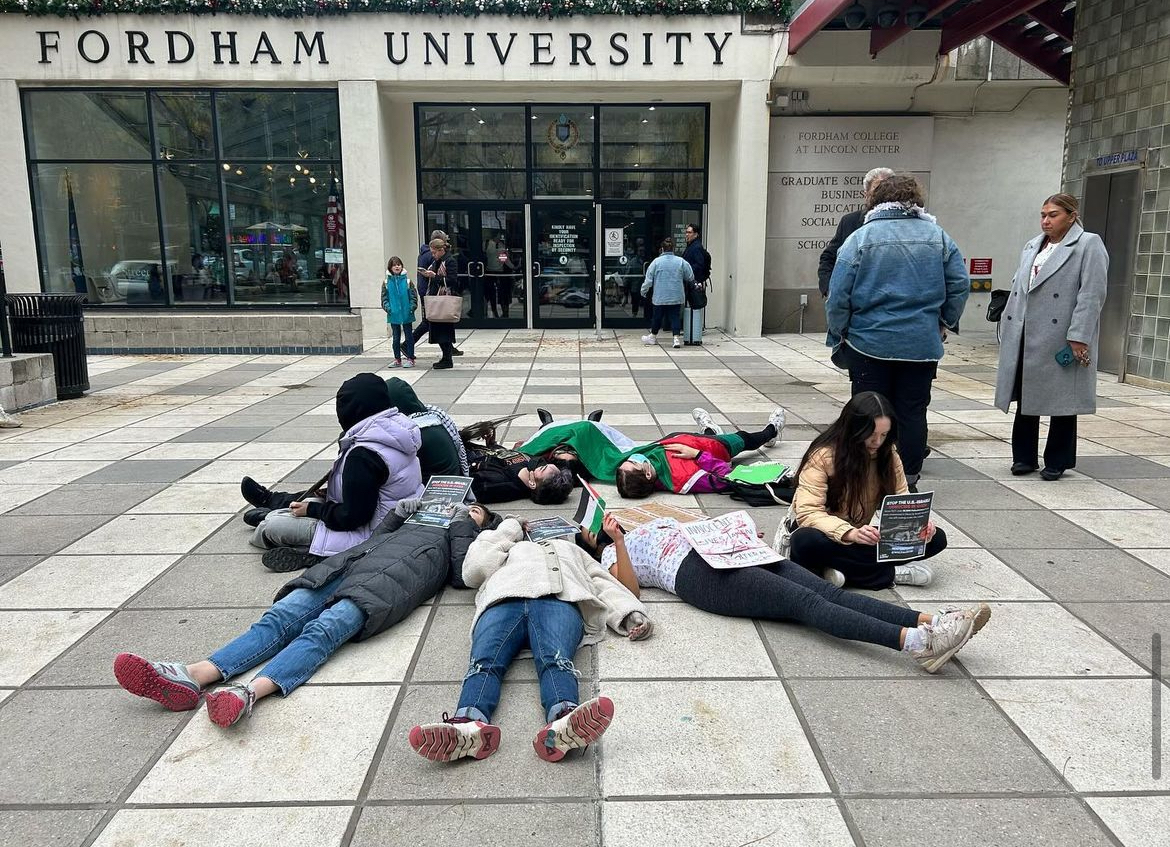The most recent email regarding the Israel-Hamas conflict by Fordham University and President Tania Tetlow was a Nov. 7 message to the Fordham community, titled “Making Fordham Safe for Every Member of Our Community.” Other actions by the university include The Center for Jewish Studies’s four-part series with Dr. Hussein Ibish and Professor David N. Myers titled, “How Did We Get Here? A Deep Dive into the History of Israel and Palestine.”
Since the start of this semester, Fordham has not issued another statement; although, at Tetlow’s student press conference, she addressed the conflict and stated her eagerness to “console the students who are in a great deal of pain,” as well as her willingness to meet with students who have criticized her response. In reaching out for further comment, Bob Howe, senior director of communications, stated they will not add to the comments made at the student press conference on Feb. 27.
Fordham’s Rose Hill Muslim Student Association (MSA) and the Students for Justice in Palestine (SJP) have continually shown support for Palestine. Some events include SJP’s protest on Jan. 19 at Lincoln Center and MSA’s Keffiyeh Day in which students wore a keffiyeh to display their support and solidarity.
SJP has continued to show support for Palestinians despite not being an official on-campus club; the SJP spokesperson requested to remain anonymous to protect themselves from any potential backlash.
In asking what new actions they are currently taking, they said “SJP is working with USG [Fordham Lincoln Center United Student Government] to get Starbucks off campus, but we realized it’s a bigger task to take on because Starbucks distributes with Aramark.” USG Lincoln Center did not respond to requests for comment. In the same vein, the spokesperson stated that SJP is working on Boycott, Divestment, Sanctions (BDS), which “is a Palestinian-led movement for freedom, justice and equality.” However, one of the biggest obstacles for SJP pushing for BDS at Fordham is the lack of monetary transparency by Fordham.
Fordham has denied SJP official club status due to their association with the broader SJP organization as a chapter, rather than being an isolated club. The SJP spokesperson said that Fordham has offered them club status so long as they change their name as to discontinue their association with the national SJP student organization. SJP continues to stand by its name and demand club status from Fordham. The spokesperson spoke on the importance of their name: “SJP, our name, is a representation of the Palestinian resistance and struggle since the first Nakbah, since 1948, since the start of oppression, and by changing our name and conforming to what Fordham wants us to do, it erases the pain of Palestinians and it erases ours as well.”
Professors and students alike are steadfast in their want for Fordham to do more. While SJP continues action, Fordham’s action has prompted a desire for space for student, professor and administrative discussions about the depth of the reality of what is happening in Gaza.
Laura Wernick, who teaches in Fordham’s Graduate School of Social Services, voiced their desire for Fordham to create greater space for discussion.
“As a Jesuit university, we should lean into having difficult conversations with each other and do so with respect,” Wernick said. “I would like to see a greater opportunity to engage students in this conversation, to model how we can engage in some really hard questions right now which includes the war in Gaza, with specific regards to the climate in which we are having this conversation, and part of that conversation is understanding [that] Jewishness is not the same as Zionism, and that Zionism is just one particular political perspective. There is actually quite a diversity of perspectives on Israel/Palestine and Zionism within the Jewish community.”
Wernick noted the importance of having this conversation with an emphasis on history and consideration of the “increase, both in the U.S. but also around the world, of white Christian supremacy and Christian nationalism which is sparking a very legitimate Jewish fear,” which also “impacts the Muslim community.” Wernick again emphasized that Fordham has the power and ability to create space for transformative discussion among students and faculty.
Tessa Hofheimer, FCRH ’26, echoed many of Wernick’s statements: “There is a need for activism and there are no spaces for students who are incredibly disturbed by the events that are transpiring and the ways that Israel has enacted this genocide against Palestinians.” Hofheimer also noted that “not all Jewish people are a part or supporters of the Zionist agenda and the language Tania Tetlow has used in her emails suggest a lack of separation between Jews and Zionists, and that is incredibly harmful to Palestinians and Jewish people.”








































































































































































































William M Tanksley • Apr 28, 2024 at 9:02 am
As a Fordham RH alum (’06) with family that was facult for decades (Dean of students, then tenured professor), I am utterly ashamed of my Alma Mater. After learning of the disgusting treatment of Fordham SJP and the subsequent lawsuits, I will never donate another penny to the school. Shocking how often Fordham’s administration are squarely on the wrong side of human rights issues repeatedly.